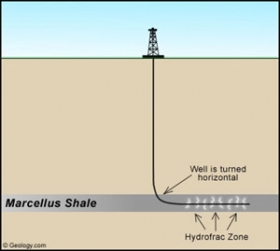New York Legislators Pass Bill Imposing Moratorium on Permits For Hydraulic Fracturing

On November 29, 2010, the New York State Assembly passed a bill imposing a state-wide moratorium on new authorizations for hydraulic fracturing. An identical bill was passed in the New York State Senate in August. The bill, which has been sent to Governor Paterson for signing, suspends until May 15, 2011 the issuance of new permits “for the drilling of a well which utilizes the practice of hydraulic fracturing for the purpose of stimulating natural gas or oil in low permeability natural gas reservoirs, such as the Marcellus and Utica shale formations.” The purpose of the moratorium is to “afford the state and its residents the opportunity to continue the review and analysis of the effects of hydraulic fracturing on water and air quality, environmental safety and public health.”
Hydraulic fracturing uses high-pressured water, combined with chemicals, to release natural gas present underground in shale formations. The use or proposed use of this process has raised concerns across the country that this process has contaminated, or will contaminate, drinking water supplies. Both the New York State Department of Environmental Conservation (“DEC”) and the federal Environmental Protection Agency (“EPA”) are currently undertaking studies of the environmental impacts of hydraulic fracturing. However, the EPA study will not be complete by the end of the moratorium, and the DEC study may not be complete by then either.
DEC is reviewing the environmental impacts of hydraulic fracturing in New York through the preparation of a Supplemental Generic Environmental Impact Statement (“SGEIS”) pursuant to the State Environmental Quality Review Act (“SEQRA”). DEC released a Draft SGEIS on September 30, 2009. The Final SGEIS has not yet been released. In April 2010, the DEC announced that the watersheds supplying drinking water to New York City and Syracuse would be excluded from the final study, placing these areas in a regulatory limbo that some have characterized as a de-facto ban on drilling in those areas.
The EPA’s study, the initial results of which are expected to be released in late 2012, focuses on effects of hydraulic fracturing on public drinking water supplies. The agency has recently sought information from natural gas companies through information requests and a subpoena about the chemical composition of fluids used in the hydraulic fracturing process, data on the impacts of the chemicals on human health and the environment, standard operating procedures at their hydraulic fracturing sites, and the locations of sites where fracturing has been conducted.
As might be expected, several environmental advocacy groups praised the moratorium, while representatives from the natural gas industry criticized it, stating that it would jeopardize jobs and state tax revenue and noting that natural gas companies would first seek to drill in states that could offer a more “hospitable” regulatory environment.
- Read more on hydraulic fracturing and the Marcellus Shale.
© Copyright 2009-2010 Sive, Paget & Riesel, P.C. All Rights Reserved. Disclaimer